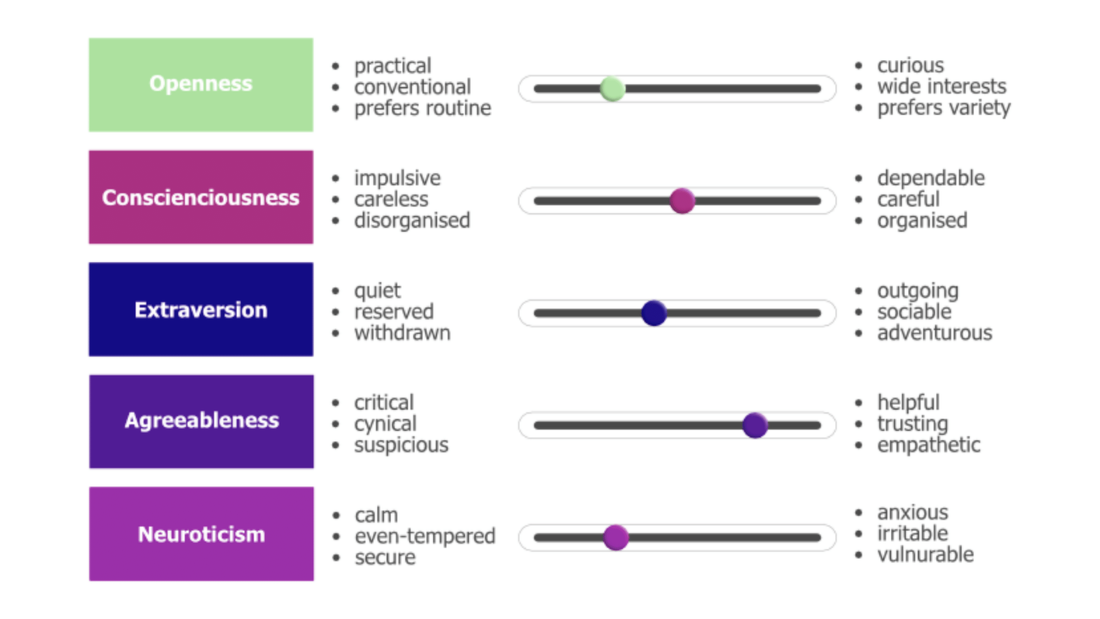|
Most personality quizzes that you’ll find online are just for fun. But they do sometimes reveal interesting things about your behavior and preferences. And while quizzes like ‘What Netflix series Should You Watch Next?’ are entertaining – and surprisingly accurate – there are also genuine psychological assessments available that can tell you even more valuable information about yourself. The Big 5 Personality Test, for example, is one of the most widely known psychological assessments. It was developed based on decades of personality research and has been translated into several languages to be used around the world. Most people can attest that knowing their personality type has helped them to better understand themselves and others. So, how can taking a personality test benefit YOU? Why should you take a personality test? There are several ways that you can benefit from taking a personality trait test. First, after taking the Big 5 Personality Test and reviewing your results, you’ll gain a deeper understanding of why you like and dislike certain things. For instance, maybe you don’t like surprises or change but never understood why. Or maybe you love variety and creativity, but never were able to pinpoint those traits before. Knowing more about these personality traits can be helpful when you’re making important decisions, such as choosing a career, deciding where to live, and what lifestyle best fits you. The results of a personality traits test can also help you identify your strengths and weaknesses. For example, you may find that you have a strong sense of self-discipline and compassion toward others, but also tend to feel anxious. This would help you to be more mindful so that you can add stress reducing activities to your day, such as meditation or yoga. Understanding personality traits can also be helpful in strengthening your relationships with others. For example, let’s say that you love to be organized and have a plan for everything, but your partner does not like structure and schedules. By better understanding each other you can gain a respect for the different viewpoints that each of you bring to your relationship. And you can better meet the needs of your partner. What is the Big Five Personality Test? Before taking the personality test, it will be helpful to understand more about the Big 5 Model. Personality research indicates that there are five basic dimensions of personality. These are called the “Big 5” personality traits (source). The Big Five traits are:
Each of the five personality traits is a continuum. Meaning that when you take the personality quiz you will fall somewhere on the scale for each trait. For example, agreeableness represents a continuum between critical and helpful. And openness represents a range from practical to curious. Every person has a unique personality. And this uniqueness originates from a combination of these five personality traits. Let’s take a closer look at each personality trait. Openness Openness is a person’s willingness to try new things as well as the ability to “think outside of the box.” People who are high in this trait tend to have a wide range of interests and prefer variety in their life. They are curious and eager to learn and enjoy new experiences. People low in this trait are more practical, prefer routine, and are uncomfortable with trying new things. Conscientiousness Conscientiousness describes a person’s level of dependability and goal-directed behavior. Highly conscientious people tend to be organized, dedicated, and aware of details. High scorers can give up immediate gratification for the sake of long-term achievement. They think about how their behavior affects others and are mindful of time. Those who score low on conscientiousness are less structured, tend to prioritize having fun, and are spontaneous. They dislike demanding schedules and have more difficulty staying focused to accomplish goals. Extroversion Extroversion refers to a tendency to seek out interaction from the outside world. It’s characterized by the level of comfort a person has in social situations and the need to join in. People who are high in extroversion are outgoing and tend to gain energy from their social interactions. They tend to enjoy social settings, seek attention, and are talkative. People who are low in extroversion (or introverted) tend to prefer spending time alone and are drained by too much social interaction. In social situations, introverts often need a period of solitude and quiet to recharge. Introverts tend to prefer one-on-one conversations, are more reserved, and self-aware. Agreeableness Agreeableness refers to how an individual interacts with other people. People that score high in agreeableness care about other people, enjoy helping others, and are trustworthy. They often put other’s needs before their own and cooperate rather than compete with others. Those low in agreeableness take little interest in others. They may be viewed as manipulative, competitive, and unfriendly. They tend to be less influenced by emotions and are less perceptive of the needs of others. Neuroticism Neuroticism describes a person’s emotional stability. It also includes how likely a person is to interpret events as threatening or difficult. Individuals who score high in this trait tend to get upset easily, experience mood swings, and feel anxious. People that score low in neuroticism tend to deal with stress well, are resilient, and rarely feel depressed. They are extremely optimistic and tend to overlook the possibility of risks and danger. Take the Big 5 Personality Test One site that offers a free Big 5 Personality Test is Truity.com. You will find out how you score on each of the scales and will learn more about your core pattern of thought and behavior. Click here to take the test: Big 5 Personality Test. Interpreting Your Results When reviewing your results please remember that no personality type is better than any other. The purpose is to learn more about yourself.
And remember that no matter what your test results reveal, there is always room for growth. Personality traits are usually stable, yet researchers have found that we can intentionally change aspects of our personalities. For example, if you score low on the conscientious scale you can still learn to develop self-discipline to achieve things that really matter to you. You will need to look closely at what is preventing you from following through and develop a plan to help you succeed. A therapist can help with this process. Consider how you can use these results in your life. If you would like to discuss the results with a professional, please reach out to schedule an appointment.
4 Comments
Leave a Reply. |
AuthorAs a therapist, Jorie Miklos enjoys helping people reach a level of personal happiness and satisfaction that they didn’t think was possible. Archives
January 2023
Categories |
|
© COPYRIGHT 2020. ALL RIGHTS RESERVED.
|
MENU
|
MENTAL HEALTH CRISIS LINES
If you need immediate help, call 911 or one of the crisis numbers below:
Crisis Line: 312-563-0445 Suicide Hotline: 1-800-273-8255 |
CONTACT
Jorie Miklos, MA, LCPC
Autumn Leaf Counseling 5757 S. Madison St. Hinsdale, IL 60521 630-228-6011 [email protected] |
Website created by Ready Set Go Website Design




 RSS Feed
RSS Feed
